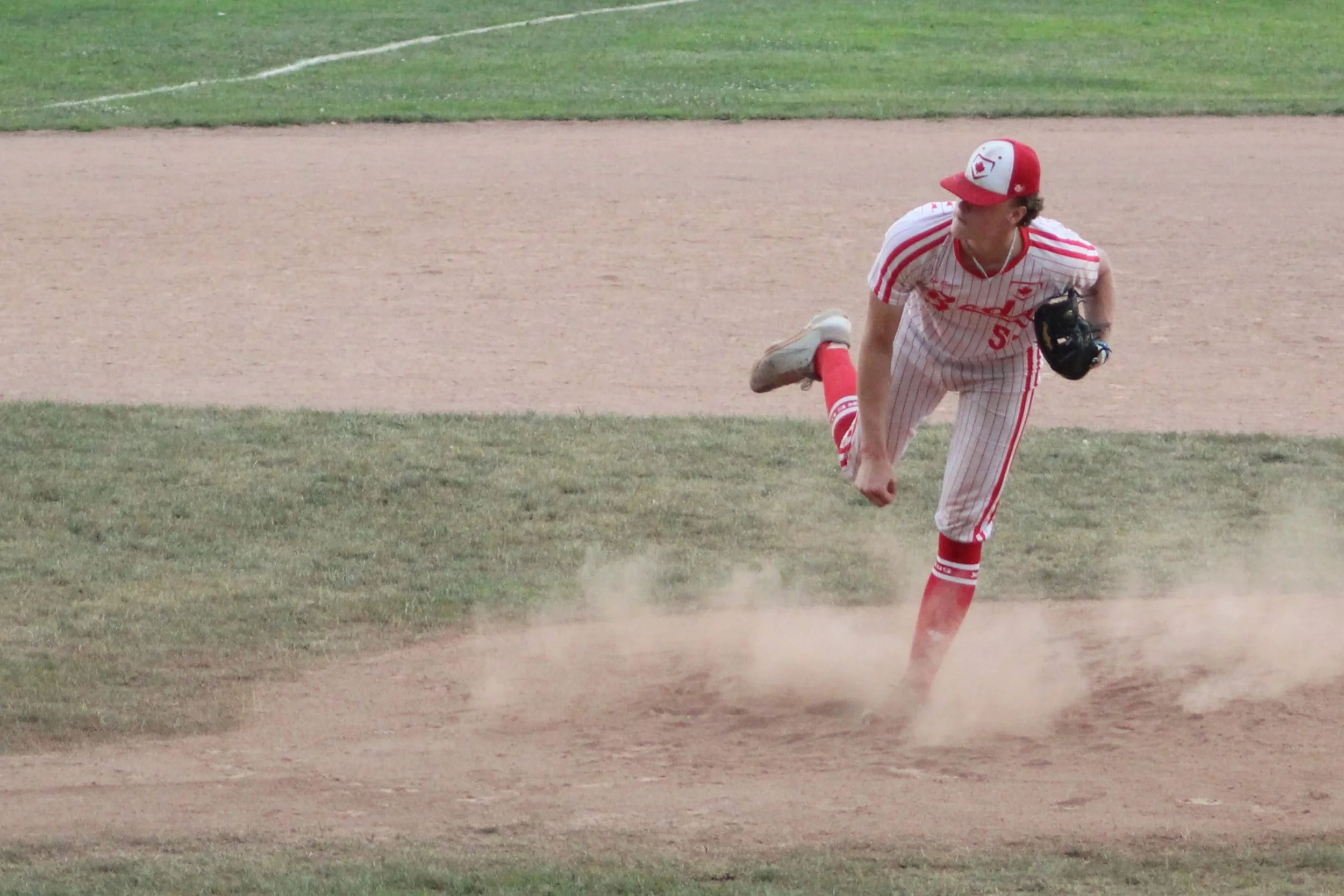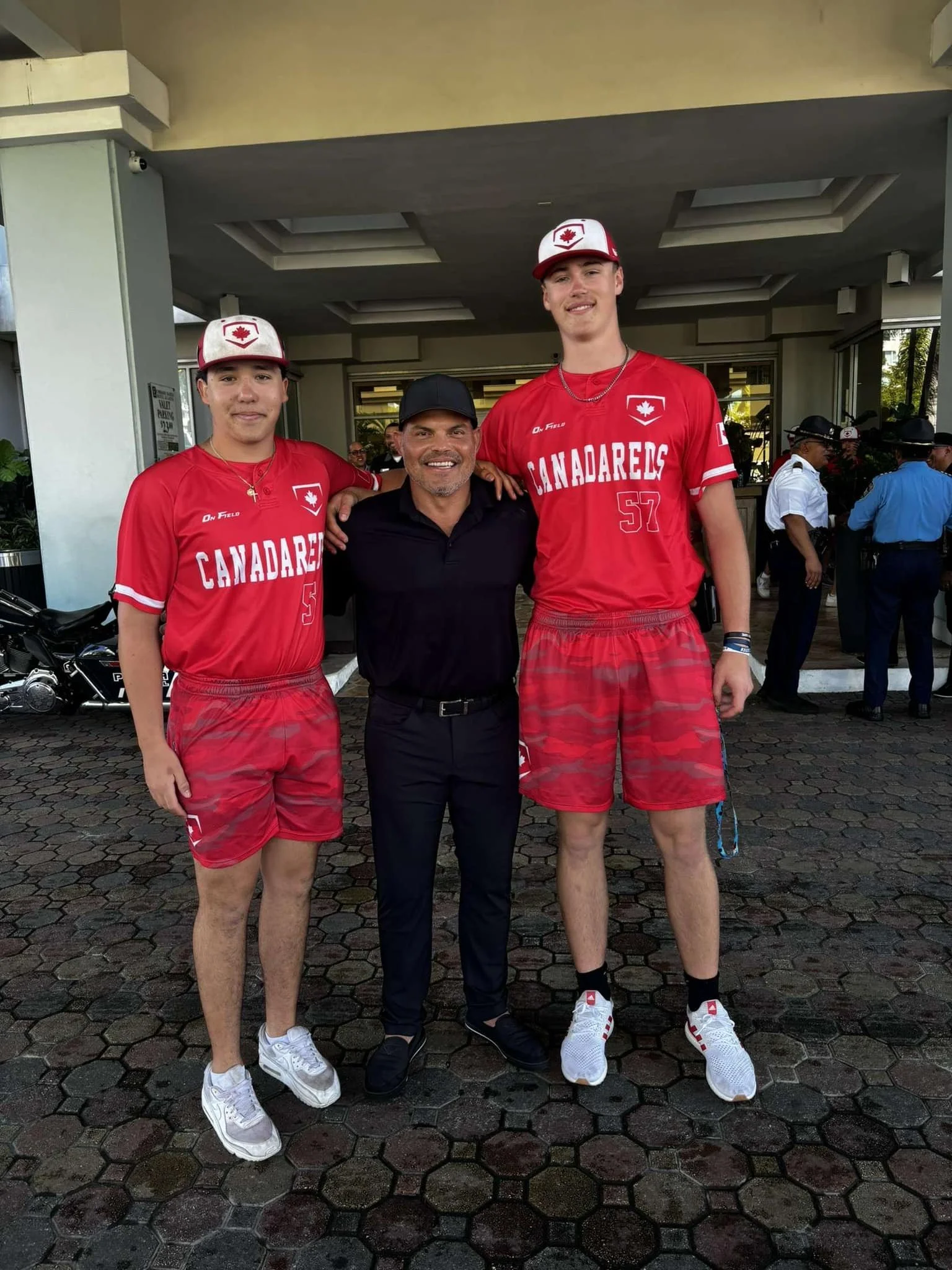Kennedy: ‘Tall Guy’ McDowell might be Kingston's next big leaguer
Canada Reds right-hander Lukas McDowell (Kingston, Ont.) has seen his velocity spike to over 90 mph. Photo supplied.
March 3, 2025
By Patrick Kennedy
Canadian Baseball Network
Pitching prospect Lukas McDowell, briefly back in Kingston at his parents' Point Pleasant home, instinctively ducks a split-second before passing through a doorway that leads into the family kitchen.
Time once was when the oldest of Matt and Petra's two children cleared that passageway without a thought. Not anymore. These days, if he doesn't duck, he'll dent his forehead, to speak nothing of the damage he might do to the door jamb.
There is a simple explanation. The towering teenager has outgrown the family home – and in the process he's grown into a body that by today is widely considered the prototype frame for a professional pitcher - big, strong and lanky, with long, loose limbs. For the record, McDowell stands 6-foot-8 and tips the Toledos at 245 pounds. And because he's only 17, those figures are subject to change.
Pitcher Lukas McDowell, 6-foot-8 and holding, stands next to a doorway in his family’s home that now requires him to duck when passing through.
When last seen toeing the rubber in these parts, with the local Colts and Junior Ponies rep teams, McDowell was an eager but raw righthander. He was still striving to learn the basics of pitching while coping with a rapidly changing body.
“I was just under six feet in Grade 8,” he points out. “When I started Grade 9, I was 6'4” and 6'7” by the end of Grade 9. It was an awkward, clumsy time for me. I was constantly growing, and it was hard to gain any weight and muscle. And from a pitching standpoint, I was always having to adjust my mechanics.”
A pause in his height and a move to the Canada Reds Baseball Academy in Ottawa two years ago has him today being courted by more than a dozen American Division I universities – and atop the Reds’ starting rotation.
“I describe Lukas as a 'high-moment' pitcher,” says Bob Fatal, head coach and owner of the U-18 Reds Academy. The team practices in Ottawa and spends the winter months in Florida, where players take online high-school courses, live together in an upscale complex near Orlando, and cook their own food.
“When I first saw Lukas,” Fatal recalls, “I had no doubt of his potential, mostly because of his size, sure, but also because he's a very determined and focused individual.
“He was hitting 69, 70 (mph) with his fastball when he first came to us,” Fatal continues. “On his first trip to Florida that winter, he was touching 80 (mph). Today his fastball averages 90, 91 (mph), and it's not going to top out there.”
As for that 'high-moment' assessment, Fatal points to his decision to start the angular righthander in the bronze-medal game at the recent International Baseball Academies Tournament (Feb 1-8) in Puerto Rico, a U-18 event that attracts 300 players and plenty of scouts and birddogs from MLB and U.S. colleges. McDowell responded by tossing three scoreless innings in a 4-3 win over Team Germany. He surrendered one hit and struck out five Germans before being removed due to tournament pitch-count rules. (The host country, with native Puerto Rican and Baseball Hall of Fame catcher Ivan 'Pudge' Rodriguez cheering them on, prevailed for a third straight year, capping an unbeaten record with a 9-1 whuppin' of Aruba in the championship game at Roberto Clemente Stadium.)
Native Puerto Rican and Hall of Fame catcher Ivan "Pudge" Rodriguez is flanked by Canada Reds pitchers Jordan Doy-Yat (left) and Lukas McDowell (Kingston, Ont.) at a U-18 international tournament earlier this month in Puerto Rico.
It's no fluke that the 10 tallest players in MLB history have all been pitchers, including San Francisco's 6-foot-11 beanpole Sean Hjelle who tops the current active list. Height undeniably provides certain physical advantages for any pitcher. It provides a release point that's closer to home plate, potentially making the pitch seem quicker while giving the batter less reaction time. A tall pitcher's longer arm span can also create a more significant downward angle for pitches, which can be challenging for hitters. Does height influence the speed of the pitch? Perhaps in some instances, depending on technique and arm strength.
Lukas McDowell (Kingston, Ont.) hopes that one day he will reach triple digits with his fastball.
McDowell says he's aiming to have his No. 1 pitch “in the 94 or 95 (mph) range" by the time he starts university in the fall of 2026. After that, “maybe triple digits,” he suggests optimistically. At the latter comment, the visitor from the newspaper points out, no doubt needlessly, that velocity means diddly-squat if a pitch comes in straight as a plumb line. Baseball is chock full of professional hitters who live to dine exclusively on fastballs, the straighter the better, no matter what speed.
“My fastball has some run,” notes McDowell, whose arsenal also includes a slider and work-in-progress changeup, “but I know I'll have to get more movement on it – and I will,” he adds with an air of confidence.
McDowell wasn't always so self-assured. He remembers pitching for the Kingston Colts U-12 club in an exhibition game in Nepean. “I gave up eight runs in the first two innings and never wanted to pitch again,” he recalls.
Instead, Kingston coach Steve Vallier sent the young beleaguered pitcher out for a third inning. McDowell retired the side on just three pitches.
“Afterwards Steve took me aside and said, 'Don't give this up, kid.' “
Years later, his former coach remembers that prudent advice.
“Lukas was already a big kid back then, and you could see he was probably going to get bigger and fill out,” recalls Vallier, who will spend this summer like he has the past 30, coaching local baseball. “He worked very hard, had lots of enthusiasm and was always willing to learn. I just told him to stick with it and give it a chance.
“I probably shouldn't say this,” Vallier adds cautiously, “but the best thing he did was to leave Kingston and play elsewhere. That's not a knock on the coaching around here, it's just that he has more opportunity to play year-round, more specialized coaching, etc. Kudos to his parents and to Lukas for pursuing his dream.”
The move to the Reds is a major commitment for McDowell and his family. During the months the team is in Ottawa, he commutes to practice three times a week. While in Florida the ballclub competes in tournaments and exhibitions against high-school, college and semi-pro teams, with March being especially hectic. The Reds – they're known as the Florida Reds during their time in the south – play 20 games in the first three weeks before ending the Florida segment at the IMG Academy National Classic, one of America's premier prep baseball events.
Not surprisingly, such high-level instruction and international competition comes at a cost – around $13,000 per player for the “Florida package,” McDowell notes.
If all goes according to plan, McDowell is likely a good bet to be drafted by a big-league club, “if not in his draft year, then definitely the year after,” says Fatal.
Vallier, for one, believes McDowell even has an outside chance to one day follow in the cleatmarks of Seattle Mariners relief artist Matt Brash and become Kingston's second big-league pitcher.
“Of course it's way too early to say, but the potential is there,” Vallier says. “A lot depends on how they develop and use him in college.”
Whatever the future holds, McDowell can likely rule out a career as a chef, says fellow Reds pitcher and roommate Jordan Doy-Yat of Aylmer, Que.
“Tall Guy almost burned the house down cooking chicken and rice,” Doy-Yat says, using McDowell's team nickname. “The house filled with black smoke, alarms went off, it was nuts.”
Having dodged that cooking calamity, Tall Guy thereafter was consigned to clean-up duties.
Patrick Kennedy is a retired Whig-Standard reporter. He can be reached at pjckennedy35@gmail.com




